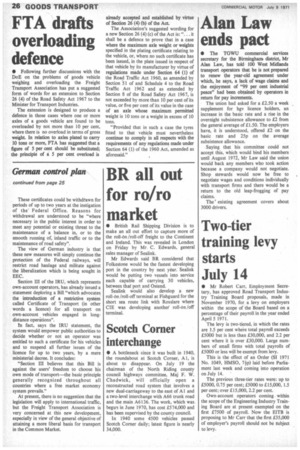German control plan
Page 28

If you've noticed an error in this article please click here to report it so we can fix it.
continued from page 25 These certificates could be withdtawn for periods of up to two years at the instigation of the Federal Office. Reasons for withdrawal are understood to be "where necessary in the public interest in order to meet any potential or existing threat to the maintenance of a balance in, or to the smooth running of, inland traffic or to the maintenance of road safety".
The view of German industry is that these new measures will simply continue the protection of the Federal railways, will restrict road haulage and militate against the liberalization which is being sought in EEC.
Section HI of the IRU, which represents own-account operators, has already issued a statement deploring a Bill "which advocates the introduction of a restrictive system called Certificate of Transport (in other words a licence) for all transport on own-account vehicles engaged in longdistance operations".
In fact, says the IRU statement, the system would empower public authorities to decide whether or not an operator was entitled to such a certificate for his vehicles and to suspend all further issues of the licence for up to two years, by a mere 'ministerial decree. It concludes: "Section IH believes that this Bill is against the users' freedom to choose his own mode of transport—the basic principle generally recognized throughout all countries where a free market economy system prevails."
At present, there is no suggestion that the legislation will apply to international traffic, but the Freight Transport Association is very concerned at this new development, especially in view of the general objective of attaining a more liberal basis for transport in the Common Market.












































































































































